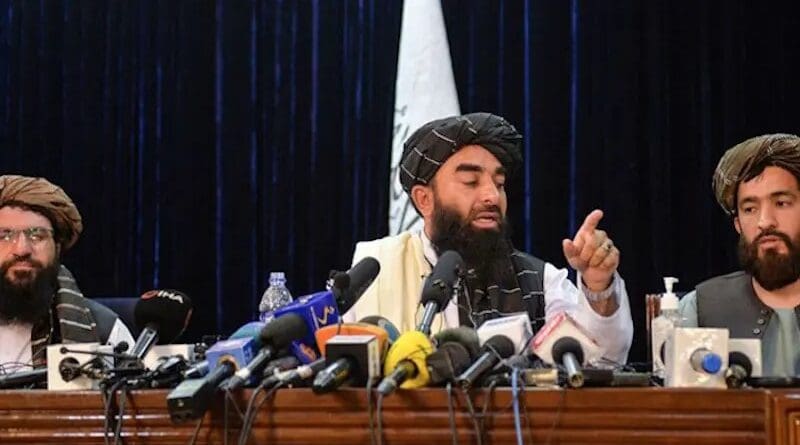Why The Taliban Struggles For International Legitimacy – OpEd
By Anwar Iqbal
The Taliban’s quest for international legitimacy has encountered formidable challenges, hindering their efforts to gain recognition on the global stage. Human rights issues, marked by restrictions on freedom of speech and strict interpretations of Islamic law, have fueled skepticism about the Taliban’s commitment to fundamental rights.
Historical ties with international terrorist organizations and the group’s role in providing safe havens have raised significant terrorism concerns, contributing to doubts about their dedication to combating global extremism. The unilateral nature of their takeover, bypassing a democratic process, has drawn global disapproval, undermining efforts to establish their legitimacy. The impact on regional stability, diplomatic isolation, evolving geopolitical dynamics, and economic challenges further compound the complexities of gaining international recognition.
One of the primary obstacles to the Taliban’s international legitimacy lies in the formation of their government, which lacks inclusivity. Concerns have been raised about the representation of minorities and the exclusion of women from decision-making roles. The absence of diversity within the government raises questions about the Taliban’s commitment to fostering an inclusive and representative administration. To gain international recognition, the Taliban must address these concerns by promoting a more inclusive and diverse governance structure.
The Taliban’s strict interpretation of Islamic law has led to human rights issues, particularly in terms of freedom of speech and women’s rights. Reports of media censorship, restrictions on artistic expression, and the curtailment of women’s participation in public life have fueled skepticism about the group’s dedication to fundamental rights. The international community remains vigilant in assessing the Taliban’s adherence to human rights standards, demanding tangible improvements to ensure broader acceptance.
Similarly, the Taliban’s historical ties with international terrorist organizations, notably their harboring of groups like al-Qaeda, have been a major obstacle to gaining international legitimacy. The global community is wary of Afghanistan once again becoming a safe haven for terrorists. The Taliban must demonstrate a clear break from such associations, actively participating in counterterrorism efforts and ensuring that Afghan soil is not used for activities that threaten global security.
Moreover, the Taliban’s takeover of Afghanistan was marked by a lack of adherence to democratic processes, raising concerns about the legitimacy of their rule. Bypassing established democratic norms, the Taliban’s unilateral approach drew widespread disapproval. The international community values democratic principles, and the absence of a transparent and inclusive political transition has significantly hindered the group’s acceptance. The Taliban needs to engage in a more collaborative and participatory political process to address this concern.
The repercussions of the Taliban’s rule extend beyond Afghanistan’s borders, impacting regional stability. Neighboring countries, concerned about the potential spillover of violence, refugee influx, and the reemergence of extremist threats, are hesitant to endorse the Taliban. Achieving international legitimacy requires the Taliban to address regional concerns, fostering stability and cooperation with neighboring nations.
The Taliban’s historical actions and the recent takeover have led to diplomatic isolation. Several countries, particularly in the West, have refrained from recognizing the Taliban government, opting for a wait-and-see approach. Overcoming this isolation necessitates the Taliban’s commitment to engaging with the international community, participating in diplomatic dialogues, and addressing the concerns that have led to their isolation.
The changing geopolitical dynamics in the region and the evolving relationships between major global players further complicate the Taliban’s pursuit of international legitimacy. The group must navigate a complex geopolitical landscape, considering the interests and alliances of various nations. Engaging diplomatically and demonstrating a commitment to regional stability can enhance their position within this intricate web of global relations.
The economic challenges faced by Afghanistan, exacerbated by the withdrawal of foreign aid and frozen assets, add another layer of complexity to the Taliban’s efforts for international recognition. The group must address economic concerns, ensuring the welfare of the Afghan population and collaborating with the international community to navigate the economic hurdles that hinder their legitimacy.
The Taliban’s quest for international legitimacy is a multifaceted challenge that requires a nuanced and comprehensive approach. Addressing inclusivity, human rights, historical ties, democratic processes, regional stability, diplomatic engagement, geopolitical dynamics, and economic challenges are imperative for the Taliban to gain broader acceptance. The international community awaits tangible actions from the Taliban to demonstrate their commitment to a more inclusive, stable, and cooperative Afghanistan. Achieving international legitimacy is not only about conforming to global norms but also about fostering a future for Afghanistan that aligns with the values of the international community.

